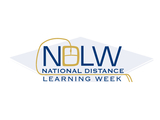National Distance Learning Week 2020 Lunchtime Series
Surviving to Thriving: Rocking the New Normal of e-Learning
One in four students take some of their courses online, and two-thirds do so at a public institution in the same state where they live (Allen, Seaman, Pouline, & Straut, 2016; Allen & Seaman, 2017). This past spring, those numbers increased dramatically when the world turned upside down.
In early November, UMBC celebrates National Distance Learning Week (NDLW) with a series of lunchtime conversations. Our theme, Surviving to Thriving: Rocking the New Normal, celebrates all the successes and challenges our campus community has experienced as we continue to adapt, teach, and learn together during the pandemic. Topics include:
Care & Feeding of Your eLearning Community: Faculty & Students Together
Teaching and learning online can make everyone feel a little isolated, especially in today’s world of social distancing. With faculty and students separated, how do we create and maintain community? While you and your students might not be in the same physical space, there are some strategies you can use to build community and increase motivation.
Beyond Blank Screens: Designing Webinars for Interactivity
Although web conferencing tools offer many opportunities to synchronously meet with your students, the experience is not quite a perfect match for the classroom experience. The rhythm of the conversation enhances and expands the interaction between students and instructors. While web conferencing tools support video for visual engagement, not all students want to be on camera. When faced with blank screens, how do we design our live sessions to maximize interactivity?
The 3 Cs of Online Learning: Communicate, Collaborate, Connect
Earlier this year, EDUCAUSE surveyed graduating seniors who reported on what worked and what didn’t during remote instruction. As incoming college/university first-year students, they outlined what they hope their professors will do this fall and how they hope to become effective online students. While students craved structure and engagement, they also wanted clarity and flexibility. What does this mean for you as an online instructor?
Impact of OER on Student Access During Remote Instruction
In the Spring of 2020 the University System of Maryland surveyed faculty across the state to understand the extent to which they believed open educational resources (OER) did or could have improved students’ access to instructional materials and eased their transition to emergency remote teaching in response to COVID-19. Join our panel of OER adopters to learn more about how they’ve used OER before and after remote instruction, finding quality materials, and helping students easily access online materials.
GO Chat: The Future of eLearning at UMBC
Online learning provides flexible opportunities to students who cannot come to campus. As UMBC invests in technology, support, outreach, and professional development, we’re faced with an important question about the future of e-Learning: Is COVID-19 merely a temporary distraction or a disruptive innovation? Join our closing roundtable for an active conversation about the future of online learning at UMBC.
From active learning and engagement to live instruction and asynchronous lecture capture, join us to discover and share the many ways e-learning has changed our teaching and learning practices.
Can't make these National Distance Learning Week sessions? Bookmark this post for updates about other virtual events!
--
References
Allen, I. E., Seaman, J., Poulin, R., & Straut, T. T. (2016). Online report card: Tracking online education in the United States. Oakland, CA: Babson Survey Research Group. Retrieved from http://onlinelearningsurvey.com/reports/onlinereportcard.pdf
Allen, I. E., & Seaman, J. (2017). Digital learning compass: Distance education enrollment report 2017. Oakland, CA: Babson Survey Research Group. Retrieved from http://onlinelearningsurvey.com/reports/digtiallearningcompassenrollment2017.pdf
Posted: October 13, 2020, 5:48 PM
